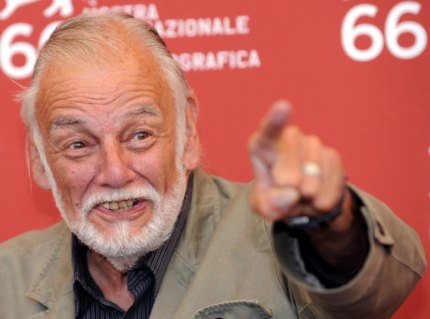
Режисер Джордж Ромеро про власні зомбі-фільми та зомбі-фільми, створені Голлівудом.
George Romero Talks ‘Road of the Dead,’ His Disdain for ‘World War Z’ and Why He Liked ‘La La Land’ More Than ‘Moonlight’
Michael Nordine, Indiewire
His latest zombie movie has yet to secure financing, but that could soon change.
Half a century after “Night of the Living Dead,” George A. Romero still isn’t done with the genre he helped create.
His latest is “Road of the Dead,” an automotive take on the undead he produced and co-wrote with Matt Birman, who’s stepping into the director’s chair after serving as second-unit director on each of Romero’s last three “Dead” pictures. There’s just one problem: The project has set to secure financing.
The two are headed to Fantasia International Film Festival in Montreal later this month to change that, and Romero is excited about hitting the road and moving forward. The film’s premise — “In the darkest days of the zombie apocalypse, the last safe place on earth is anything but, as a mad despot uses the spectacle of high-octane carnage to keep control of his populace” — suggests a “Mad Max” vibe. It also serves to remind that, from “Dawn” to “Day” to “Land” and now “Road,” the decades-old franchise is ever-changing.
“There was a sequence in ‘Survival of the Dead’ where there’s a zombie that’s behind the wheel of a car, and Matt proposed an idea: ‘How about zombies that know how to drive!?’” Romero explained over the phone during a 4th of July interview. (He lives in Canada, where he’s a permanent resident.) That setup is certainly in keeping with some of the biggest action movies in recent years, a connection Romero readily copped to: “It’s ‘Fast and the Furious’ with zombies at the wheel,” he said. (The press notes cite “Ben-Hur” as a direct influence.)
Birman is the zombie progenitor’s “best friend in the biz,” so co-writing the project together was an organic process; Matt Manjourides and Justin Martell are also onboard as producers. Romero considers himself more of “a story guy” anyway, and the stunt-intensive nature of “Road of the Dead” “isn’t [his] cup of tea.”
Neither, for that matter, is the state of the zombie genre post–”World War Z” and “The Walking Dead.” “It was probably bound to happen,” Romero said of the fact that David Fincher is directing the sequel to “World War Z,” which he particularly dislikes.
“I harbor a lot of resentment…I used to be the only guy on the zombie playground, and unfortunately Brad Pitt and ‘The Walking Dead’ have made it Hollywood-ized. I was ready to do another one, a $2-3 million one, and nobody will finance a zombie film now.” Hollywood is only interested in the undead when they have blockbuster potential, which something like “World War Z” ($540 million in box-office returns) does but a small-scale “…of the Dead” installment might not.
“It’s not really resentment,” he clarified. “I’ve had a terrific run.” Asked whether it’s strange to step back and see what the genre he helped innovate with “Night of the Living Dead” half a century ago has taken on, he said, “Of course, but mine have always been political. It’s not gore, it’s not just horror — I’ve always tried to put a little something in there. I felt that I almost found a niche, but it was bound to happen,” he said of the way the zombie genre has become something bigger and more unwieldy. “There was no way to prevent that from happening.”
As for his own movies, Romero reluctantly admitted that 1985’s “Day of the Dead” is his favorite, but “only because there was not a bad apple, not a bad moment on the set, everybody was there to make the movie and it was wonderful. It’s hard to say — it’s like, ‘What kid do you like?’”
It isn’t as difficult to choose between films he didn’t make. “I have to confess to not liking ‘Moonlight,’” Romero said after being asked what recent movies he’s liked or disliked. “I had heard all the hype and all the stuff about, ‘It’ll make you weep,’ but I don’t know, there was something about it that just didn’t appeal to me.
“I vote in the Academy, and I wound up voting for ‘La La Land’ just because I thought it set about a purpose and it accomplished it. I didn’t think anything else was actually that good or accomplished.”
Michael Nordine, Indiewire, 4 липня 2017 року
